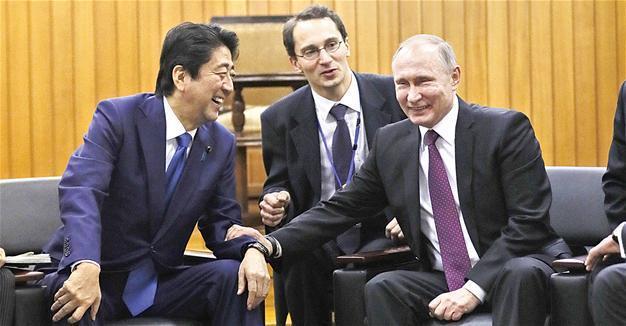Putin, Abe signal no resolution on island dispute
TOKYO
 Japanese Prime Minister Shinzo Abe and Russian President Vladimir Putin wrapped up two days of talks on Dec. 15, with numerous economic deals but no big breakthrough on a territorial row that has over-shadowed ties since World War Two.
Japanese Prime Minister Shinzo Abe and Russian President Vladimir Putin wrapped up two days of talks on Dec. 15, with numerous economic deals but no big breakthrough on a territorial row that has over-shadowed ties since World War Two. Putin was heading home with promises of economic cooperation after appearing to achieve what experts said was a key objective - easing international isolation when Russia faces Western condemnation over the destruction of eastern Aleppo in Syria, where it is backing President Bashar al-Assad’s forces.
Many of the dozens of deals finalized during his visit to Japan this week involve the energy sector, and most are projects linked to some of both countries’ largest corporations.
Abe and Putin agreed to launch talks on joint economic activities on disputed islands at the center of the territorial row as a step toward concluding a peace treaty formally ending World War Two, the two sides said in a joint statement.
The islands in the Western Pacific, called the Northern Territories in Japan and the Southern Kuriles in Russia, were seized by Soviet forces at the end of World War Two and 17,000 Japanese residents were forced to flee.
The dispute over their sovereignty has prevented the two countries signing a peace treaty.
Abe said he and Putin had taken “an important step” toward a peace treaty but concluding one would not be easy.
“The issue won’t be solved if each of us just make their own case,” Abe said at a news conference with Putin, according to Reuters.
“We need to make efforts toward a breakthrough so that we don’t disappoint the next generation. We need to set aside the past and create a win-win solution for both of us.”
Putin dismissed the notion that he was only interested in getting economic benefits from Japan.
“If anyone thinks we’re interested only in developing economic links and a peace deal is of secondary importance, that’s not the case,” he told the same news conference.
“For me, the most important thing is to sign a peace agreement because that would create the conditions for long-term co-operation.”
















